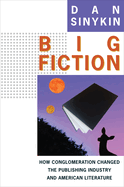
For some people, thrill rides are found at Disneyland. For certain types of readers, a thrill ride can be found in Big Fiction: How Conglomeration Changed the Publishing Industry and American Literature, Dan Sinykin's scintillating take on the David and Goliath battle, in which free-spirited publishers fought to hold their own against corporate giants.
Publishers have always adapted with the times: postwar prosperity, 1970s inflation, and so on. But their biggest reckoning was surely with conglomeration. It was an era that began around 1960, and Sinykin (American Literature and the Long Downturn) writes cogently and persuasively of its ripple effects on novels like E.L. Doctorow's Ragtime, David Foster Wallace's Infinite Jest, and Joan Didion's The Last Thing He Wanted. In Sinykin's words, Big Fiction tells "a single story--with many subplots--about U.S. fiction since 1960," and his cast comprises both unheralded industry insiders (editors, agents, publicists) and household-name authors, among them Stephen King, Danielle Steel, and Toni Morrison.
Despite Sinykin's fulsome admiration for writers, it is his ambition to "break our habit of romanticizing authorship and begin instead to see the author through the colophon's portal." He devotes chapters to mass market, trade paperback, nonprofit, and, finally, independent presses, with the "obstinate anachronism" W.W. Norton as the vanquishing underdog: it's the only big indie trade house left standing at the time of this book's writing. In Sinykin's distillation: "Why did bestsellers and prize winners become segregated? Follow the money." The most inspiring aspect of Big Fiction is its reporting on writers who didn't. --Nell Beram, author and freelance writer

